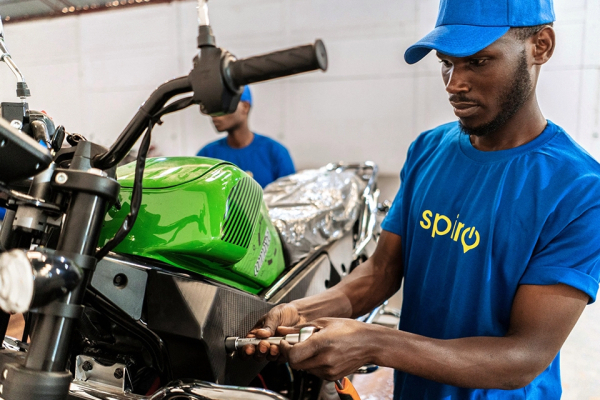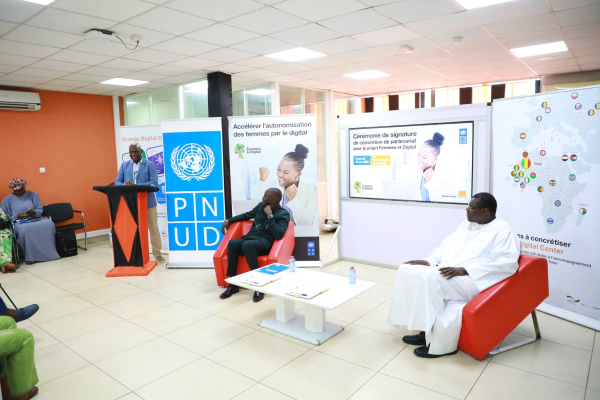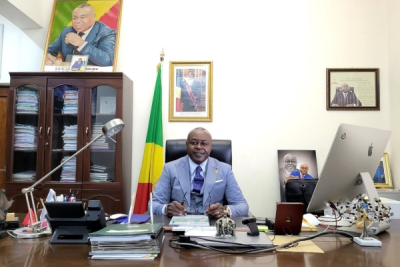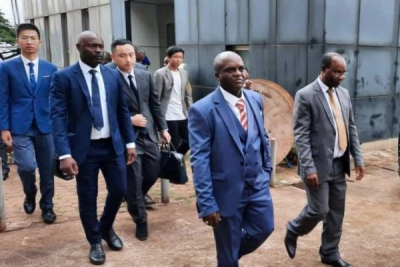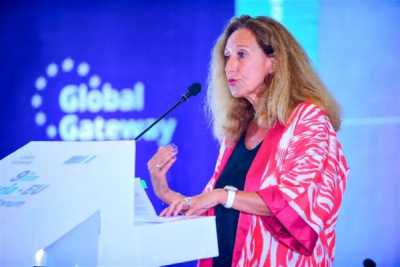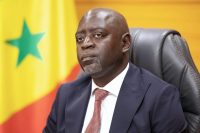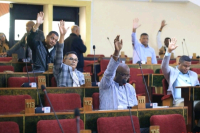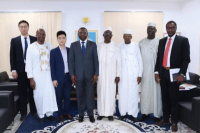
Tech (805)
African startup funding continues to decline sharply with the first half of 2024 being the quietest semester since late 2020. This represents a significant drop from previous years, with the "Big Four" startup hubs of Nigeria, Kenya, Egypt and South Africa continuing to dominate the funding landscape
African startups raised $780 million in the first half of 2024, a 57% decline compared to the same period in 2023, according to data released on Thursday, July 4, by Africa: The Big Deal, a database tracking investments of over $100,000 in the continent's startup ecosystem.
Of the total funds raised, 66% ($513 million) were in the form of equity, while $254 million (33%) were secured as debt. Startups in the Big Four countries (Kenya, Nigeria, Egypt, and South Africa) accounted for 79% of the total funds raised during this period.
Kenya led with $244 million (32%), followed by Nigeria with $172 million (23%), Egypt with $101 million (13%), and South Africa with $85 million (11%). Among other countries outside the Big Four, Benin stood out with $50 million raised by the startup Spiro through debt from Afreximbank, while Ghana followed with $29 million, Uganda with $19 million, Morocco with $14 million, and Senegal with $11 million.
Transport and logistics startups, driven by Nigeria's Moove ($100 million) and Benin's Spiro ($50 million), led the sectors with $218 million, representing 28% of the total funds raised. Fintech followed with $186 million (24%), and startups in the energy and water sectors rounded out the top three with $132 million (17%)
Adoni Conrad Quenum
With the acceleration of digital transformation, digital skills have become indispensable assets in Africa. To equip the population with these crucial competencies, strategic partnerships are being established.
Orange Mali, a subsidiary of telecom group Orange, has signed a partnership with the United Nations Development Programme (UNDP) to train 3,000 young people, particularly young women, in digital skills over a two-year period. The announcement was made via a press release issued by the UN body on Monday, July 1.
"With great pride and immense satisfaction, we announce the signing of this partnership agreement between UNDP Mali and Orange Mali. [...] Women, while representing an essential force, are underrepresented in the technology sectors," stated Maleye Diop, UNDP Resident Representative in Mali.
He added, "Our goal is to create a coherent vision of youth integration through concrete programs that allow them to become operational quickly. This project is just the first step towards other promising initiatives to come."
In an increasingly digital world, having digital skills has become indispensable. All sectors of activity are moving towards digitalization, and it is urgent to adapt to this new world. The World Bank, in its 2021 report titled "Digital Skills: The Why, the What and the How," emphasized that significant deficits in digital skills on the continent expose the economies of many African countries to the risk of falling further behind as the digital frontier rapidly evolves.
Orange Group, through its strategic plan "Engage 2025," prioritizes the development of digital skills on the continent. The proliferation of Orange Digital Centers in many countries across Africa, including Mali, and the signing of this partnership with UNDP are part of this plan. The pilot phase of the program has already been launched, aiming to train 200 young women in areas such as digital marketing, web development, graphic design, and video editing.
Adoni Conrad Quenum
In Africa, rapid technological progress has delivered numerous benefits, but it has also introduced new threats that jeopardize individuals, businesses, and governments.
The Republic of Congo is taking steps to establish a National Commission for the Protection of Personal Data. The draft bill, presented by Minister of Posts, Telecommunications, and Digital Economy Léon-Juste Ibombo, was approved by the Council of Ministers on Wednesday, July 3.
"Indeed, the protection of personal data has become a major issue in the digital age. With the multiplication of information exchanges on the Internet, it is essential to ensure the confidentiality and security of citizens' personal data," explained Ibombo.
The National Data Protection Commission will be responsible for ensuring that personal data processing does not infringe on citizens' rights and freedoms. It will collaborate with international institutions and other African countries to share best practices and relevant information on cybersecurity threats. The Commission will also raise awareness among citizens and businesses about cybercrime risks and provide training on protective measures.
The creation of this commission is part of the Congolese government's efforts to strengthen current legislation, promote an attractive and secure economic environment, and ensure rigorous control over personal data use. Congo already has a National Information Systems Security Agency (ANSSI) and a law on personal data protection. It has also ratified the Malabo Convention on Cybersecurity and Personal Data Protection.
The Commission's implementation is expected to bolster the fight against cybercrime in Congo and across Africa. According to the 2024 Security Navigator report by Orange Cyberdefense, extortion cases increased by 70% in 2023, resulting in a 10% GDP loss on the continent. This alarming rise underscores the urgency of having an effective regulatory body to protect citizens' and businesses' data.
In recent years, Africa has witnessed the launch of numerous smart city projects aimed at bridging the technology gap affecting the continent.
Brigadier General Bonjean Rodrigue Mbanza, Gabon's Minister of Digital Economy and New Information Technologies, made an official visit to Cameroon on Tuesday, July 2 to explore technologies for a Smart City project in Gabon. The visit aimed to examine existing technologies and draw inspiration to support the development of the project.
According to a statement from the Ministry of Digital Economy, the visit included an inspection of the National Command Center for Video Surveillance and the Data Center in Yaoundé. This visit is part of the Gabonese government's efforts to seek partners and expertise for implementing Smart City projects in several Gabonese municipalities. In April, the minister also visited Shenzhen, China, where he met with Huawei executives and toured the tech giant's advanced infrastructure.
By exploring various technological solutions offered by multiple partners, Gabon aims to select the most suitable one for its needs. Similar to Smart City projects already deployed in several African cities, the Smart City initiative in Gabon aims to address complex urban challenges by creating intelligent urban ecosystems. These ecosystems will focus on areas such as planning, infrastructure, population management, and more.
This ambitious initiative demonstrates Gabon's commitment to integrating cutting-edge technologies into its urban development strategy. The project seeks to improve the quality of life for its citizens and position the country as a regional leader in smart cities.
Samira Njoya
Agriculture is a crucial sector for the majority of African countries. Substantial investments are needed to improve yields and support growth.
On Tuesday, July 2, in Abuja, the European Union (EU), in partnership with the Economic Community of West African States (ECOWAS), unveiled a new digital platform aimed at boosting investments in Nigeria's agro-food sector. This initiative was presented on the sidelines of the 9th edition of the EU-Nigeria Business Forum.
Speaking on the significance of this innovation, Myriam Ferran, Deputy Director-General of the European Commission's Directorate for International Partnerships (INTPA), stated that it is "An agribusiness platform is a form of a digital agricultural platform that provides digital marketing, trading or investment space for commercial and transactional activities, interactions, communications, integrations and cooperation in the agri-food system and agro-industry between Nigerian and European SMEs."
The launch of this platform aligns with commitments made during the EU-Nigeria ministerial dialogue in November 2020. According to the agreement with the Nigerian government, it was decided to create an EU-Nigeria agro-industrial platform to bring together Nigerian and European agricultural and agri-food communities to promote trade, attract responsible investments, and foster business-to-business relationships, particularly for SMEs.
In Nigeria, agriculture holds a significant position in the economy, being the second most important activity after the oil sector. According to data platform Statista, the agricultural sector generated about 21% of the country's gross domestic product (GDP) in the second quarter of 2023. However, despite its substantial contribution, Nigeria's agricultural sector faces numerous challenges, including a lack of investments, outdated farming systems, and insufficient supply to meet the growing population and increasing food demand.
The new platform is expected to address these challenges, increase private investments in the country's agro-industrial sector, and strengthen links and interactions between agro-industrial actors in Nigeria and Europe.
Samira Njoya
Cybersecurity has become a significant concern for African countries in recent years. As African nations actively participate in the global technological revolution, they have also become increasingly vulnerable to cyber threats. The ongoing digital transformation across the continent has exposed the weaknesses and vulnerabilities present in Africa's cyberspace.
On Monday, July 1, Russian multinational information security company Kaspersky offered four recommendations to protect against online fraudsters in West Africa (commonly known as "brouteurs"). The recommendations include generating complex passwords, being wary of suspicious SMS messages, looking for the padlock symbol on websites, and downloading applications from reliable sources.
These recommendations follow a study conducted by the Russian cybersecurity firm in January 2024, surveying 200 people on mobile phone usage in West Africa. The study highlights the growing threats posed by "brouteurs," whose activities severely undermine digital trust and security in the region. Their scams range from social media impersonation, fake loans and scholarships, online purchases, and counterfeiting, to contests and competitions, as well as health and beauty scams, webcam schemes, and remote access frauds.
"With increasing Internet access in West Africa, online security is becoming a concern for local populations. In Côte d'Ivoire and Senegal, 46% of the population connects to the Internet daily, approximately 9.6 million users. [...] 50.5% of Ivorians and Senegalese use their mobile phones daily for professional and personal needs. Social networks are used by 87.7% of users, followed by video calls (68.1%) and geolocation applications (60.8%)," noted Kaspersky.
According to Kaspersky, increased connectivity exposes users to various cybercrime risks, including romance scams that exploit social media and communication platforms. These scams caused over $1.3 billion in global losses between 2017 and 2022, with an average loss of $4,400 per victim, according to Interpol.
In Africa, cybersecurity issues are still rarely addressed at the national level due to a lack of skills or infrastructure. According to the 2020 edition of the "Global Cybersecurity Index" report published by the International Telecommunication Union, the cybersecurity indices of Côte d'Ivoire and Senegal were 67.82 (11th place) and 35.85 (18th place) respectively. Several countries in the region, such as Mali (10.14), Niger (11.36), and Guinea (20.53), are more vulnerable.
However, authorities in various countries are increasingly taking measures to secure their cyberspace. They are implementing national cybersecurity strategies, establishing national computer incident response teams, and joining conventions such as the Malabo Convention on Cybersecurity and Personal Data Protection and the Budapest Convention on Cybercrime.
Adoni Conrad Quenum
Senegal's Digital Strategic Development Plan hinges on the digitalization of its government administration. However, despite significant investments in this initiative, the anticipated results have not yet materialized.
Senegal is lagging behind in its objectives for the digitization of public services, with only 130 out of 900 procedures completed, a rate of 13.4%, according to Isidore Diouf, the CEO of public digitization agency Sénégal Numérique (SENUM SA). The official presented the figure on June 28, during a discussion on digital technology at a business conference.
Senegal began digitizing its public administrative services in 2017. In 2022, SENUM signed an agreement with 19 municipalities in Dakar to digitize civil status documents. By July 2023, XOF8 billion (13 million USD) had been invested to implement the 2023-2027 Digital Master Plan for Justice, aimed at creating a more accessible digital judicial service. The health sector has also received significant attention.
Continuing this trend, in November, the Senegalese Ministry of Communication, Telecommunications, and Digital Economy, in partnership with the German International Cooperation Agency (GIZ), unveiled GovStack, a new platform designed to handle over 800 administrative procedures.
While the reasons for this low digitization rate have not been clearly stated despite substantial investments, it is clear that many challenges remain. These include drafting regulatory texts to establish a governance framework for digitization and implementing an e-government strategy to accelerate the process. Support from all stakeholders and collective commitment are essential for successful digitization.
It should also be noted that in Senegal, some priority services are already online, including those in urban planning, tourism, justice, education, labor and social security, public service, interior, sports, consular civil status, and the environment
Samira Njoya
The African Union Convention on Cyber Security and Personal Data Protection was adopted in 2014 in Malabo, Equatorial Guinea. Ten years later, Madagascar has joined the list of countries that have ratified it.
Last week, the Malagasy Ministry of Digital Development, Posts, and Telecommunications announced Madagascar's accession to the Malabo Convention on Cyber Security and Personal Data Protection. The aim is to ensure a safer cyberspace and effectively combat cybercrime.
With this accession, Madagascar will be able to "integrate the legal benchmarks regarding the implementation of personal data protection policies by the CMIL (Malagasy Commission for Computing and Freedoms) and the ANSSI (National Agency for the Security of Information Systems or CIRT in English)."
This move comes at a time when cybersecurity has become a crucial component due to the acceleration of digital transformation across the continent. African countries have been compelled to address this issue, and since the COVID-19 pandemic, many have expedited the ratification of the African Union Convention on Cyber Security and Personal Data Protection, adopted in 2014 in Malabo.
The Convention aims, among other things, to protect personal data within the framework of cybersecurity legislation; facilitate cooperation to ensure the security of personal data and combat digital crime by promoting information exchange between national entities; use electronic technologies to secure personal data at the national level; and combat cybercrime by establishing specific entities in each signatory country.
According to the 2020 edition of the "Global Cybersecurity Index" published by the International Telecommunication Union, Madagascar has a cybersecurity index of 23.33 and ranks 24th in Africa, just ahead of Guinea (20.53) and behind Mozambique (24.18).
It is noteworthy that Angola, Benin, Togo, Senegal, Rwanda, Namibia, Niger, Mauritius, Mozambique, Ghana, Zambia, the Democratic Republic of Congo, Cape Verde, Guinea, Ivory Coast, and Mauritania have already ratified the convention.
Adoni Conrad Quenum
Over the past five years, the African video game market has experienced rapid development. Previously almost non-existent, it has gradually gained international visibility thanks to the efforts of numerous local studios.
On Friday, June 28, the American video game publisher Xbox, owned by Microsoft, honored Cameroonian game studio Kiro’o Games. Xbox showcased an exclusive trailer on its ID@Xbox YouTube channel, which promotes the best upcoming indie games for Xbox One and Windows PC, celebrating Kiro’o Games’ 20 years of work. This promotional communication comes a month after the release of “Aurion: Legacy of the Kori-Odan,” developed by Kiro’o Games, on Xbox Series X|S and Xbox One.
The Xbox trailer highlights the evolution of Aurion from a small amateur project on RPG Maker to an independent game with beautiful hand-drawn graphics. The original game was created using the XNA framework, which was freely offered by Microsoft at the time and allowed many studios to embark on their independent ventures.
“Aurion: Legacy of the Kori-Odan” is an action-RPG set in an African Fantasy context inspired by classic J-RPGs like “Tales of.” It draws on African myths and legends, offering real-time combat in a 2D view. Players take on the role of the exiled king or queen of Zama, aiming to harness their “aurionic” power to build a world where everyone can understand each other despite their differences. The game’s narrative focuses on the challenge of remaining altruistic in a cynical and selfish world.
“We know the current situation is tough for everyone. That's precisely why we hope players will discover the Kori-Odans and be inspired by the message hidden in their Legacy and in Aurion. If you’re a humanist idealist feeling crushed by the world's coldness, Aurion is written for you,” explains Olivier Madiba, founder of Kiro’o Games and creator of Aurion.
Since 2013, the African video game industry has been growing. Across the continent, a generation of enthusiasts is mobilizing to exchange experiences and develop higher quality products. The goal is to showcase African stories and expertise. This is one of the reasons why a dozen game studios decided in February 2022 to pool their efforts within a group, the Pan Africa Gaming Group (PAGG), of which Kiro’o Games is a member.
According to consulting firm Verified Market Research, “the African video game market is growing rapidly due to the increasing adoption of smartphones, improved internet access, and a younger, tech-savvy population. Affordable mobile devices and better internet infrastructure have made online gaming more accessible to a wider range of people, increasing the demand for localized content that reflects the continent’s cultural and linguistic diversity.”
“Urbanization and rising disposable incomes have given birth to a growing middle class eager for digital entertainment, pushing game creators to offer specialized experiences to African gamers. This is expected to drive the market revenue to exceed $2.14 billion by 2024 and reach a valuation of approximately $3.72 billion by 2031,” the consulting firm adds.
For the Cameroonian studio, the confidence shown by Xbox will allow it to reach a vast potential player base worldwide, ensuring visibility, credibility, and revenue opportunities.
Muriel Edjo
The Chadian government has recently revived its efforts to drive digital transformation in the country. The selection of strategic partners will be critical to achieving the ambitious goals laid out in its new digital development strategy.
Chinese technology company Huawei has expressed its commitment to supporting Chad in realizing its digital projects. On Friday, June 28, Prime Minister Allah-Maye Halina received a delegation from Huawei Technologies led by its director in Chad, Feng Guo Jeremy.
The discussions focused primarily on digital projects and the improvement of information and communication technologies (ICT) in Chad. Huawei has offered to assist the government in achieving its technological development goals.
The delegation's visit comes nearly a year after the signing of a memorandum of understanding between the Chadian government and Huawei during Huawei Connect 2023. Under this agreement, Huawei committed to becoming a key partner of the Chadian government and to assist in building an ecosystem conducive to the growth of digital talents in Chad.
The support from Huawei is expected to significantly advance Chad's digital projects included in the new government's program. These projects encompass the improvement of digital infrastructure, the integration of digital technologies in the educational system, the digitization of government services, and technological innovation.
Chad currently lags significantly in the digital sector. According to DataReportal, the country had 3.2 million internet users in January 2023, representing an internet penetration rate of 17.9%. During the same period, the number of mobile phone users was 11.5 million, with a mobile penetration rate of 63.9%.
Samira Njoya
More...
Orange continues to expand its Orange Digital Center network across the continent. Following launches in Dakar, Senegal; Bamako, Mali; Conakry, Guinea; and Freetown, Sierra Leone, Bissau, the capital of Guinea-Bissau, is now set to inaugurate this ecosystem dedicated to developing digital skills.
Orange, a leading telecom operator in Africa, has inaugurated the Orange Digital Center in Guinea-Bissau on June 28, 2024. The center, located in the capital Bissau, aims to train young people in digital skills, enhance their employability, and encourage innovative entrepreneurship.
The Orange Digital Center in Guinea-Bissau is part of a network of 26 similar centers across Africa, the Middle East, and Europe. It includes a coding school, a solidarity FabLab, a startup accelerator "Orange Fab," and is supported by Orange Ventures Africa, the group's investment fund dedicated to promising startups.
"This space is more than just a technological center; it is a promise of transformation and growth for the digital future of Guinea-Bissau and Africa. By providing free access to cutting-edge resources, we hope to inspire a new generation of creators and leaders, and contribute to an inclusive digital economy," said Brelotte Ba, Deputy CEO of Orange Africa and the Middle East.
The establishment of the Orange Digital Center in Guinea-Bissau aligns with the French telecom operator's strategy to position itself as a leader in digital transformation on the African continent. According to a World Bank report published in September 2022, the Bissau-Guinean government is committed to strengthening the country's digital skills, despite lacking the capacity to invest in the necessary resources. The absence of a national information and communication technology policy and strategy makes achieving several sustainable development goals by 2030 uncertain. Programs like Orange's help mitigate the issue while awaiting public authority actions.
Access to digital skills can improve access to basic public goods and services (e-government, telehealth, etc.), local financial services (online banking, digital payments, etc.), and promote better use of public information and digital platforms. It can also support an inclusive digital economy and contribute to the continuity of education by providing better access to distance or technology-assisted learning. As of early 2024, the internet penetration rate in Guinea-Bissau was 31.6%, according to DataReportal.
Adoni Conrad Quenum
Music holds a prominent place in Cameroon's cultural sector. Recognizing this significance, Orange has introduced initiatives to support industry stakeholders.
Orange Cameroon has relaunched its Orange Music Legends program in partnership with Cameroonian music legends. The telecommunications company announced this on Wednesday, June 26, during a press conference. This initiative aims to support and promote new musical talents across various genres.
This year, five iconic duos will be formed, each consisting of a legendary artist and a leading artist of the new generation. Together, they will revisit great hits that have resonated with multiple generations of music lovers. The event will take place on Wednesday, July 3, at the Yaoundé Multipurpose Sports Complex (Paposy).
Entrance tickets are free and can be downloaded via the Max it app, which provides access to Orange's services. The app is available on the Play Store and App Store. To download the super app Max it, click on "Marketplace," then "Event & Ticket." Select your ticket type: a free classic ticket or a VIP ticket (5,000 CFA Francs, or €7.61) for closer access to the stage. Complete your purchase and download your ticket.
Season 2 of the program promises to be even more spectacular with 24 episodes over 13 weeks, compared to 12 episodes previously. Additionally, games and quizzes will offer prizes totaling 5 million CFA Francs. The winning duo will receive 10 million CFA Francs. All votes will be cast via the Max it super app.
This initiative not only celebrates Cameroon's rich musical heritage but also supports the new generation of artists by providing them with a platform to gain recognition and collaborate with iconic figures in Cameroonian music. Alongside promoting local culture and talent, Orange Cameroon continues to innovate by offering practical digital solutions for its customers, thus reinforcing its commitment to digital transformation and support for the country's creative industries.
Samira Njoya
Across Africa, the job market is increasingly requiring individuals with strong digital knowledge and capabilities. As a result, it has become imperative to provide training to a large number of people in this critical field.
Samsung Electronics Maghreb Arab (SEMAG), the Moroccan subsidiary of the Korean technology giant Samsung, announced on Wednesday, June 26, the signing of a partnership with the Ministry of National Education, Preschool, and Sports. This initiative aims to expand their collaboration on the "Samsung Innovation Campus" (SIC) program, which promotes digital education in Morocco.
As part of this new collaboration, the SIC program will be extended to all secondary school computer science teachers for training and certification in Python programming. Additionally, the first national programming competition will be launched to encourage excellence and innovation in Python among Moroccan students.
According to the government, this partnership aligns with the objectives of the 2022-2026 Information and Communication Technology roadmap, which aims to equip teachers and students with essential skills to thrive in the digital age. For Samsung, the initiative is part of its global corporate social responsibility (CSR) strategy, which seeks to provide young people with the opportunity to learn crucial technologies and gain skills to improve their career prospects.
Since the program's launch in 2019, over 10,000 students have acquired coding skills thanks to 211 teachers across nine centers equipped with more than 500 computers and televisions. A total of 562 teachers have been trained and certified in Python programming.
This partnership brings Morocco closer to achieving the goals of the African Union's Digital Education Strategy, which advocates for the promotion of digital skills among teachers and students. The strategy also aims for at least 20% of students and 50% of teachers on the African continent to have access to digital devices by 2027, with a target of one-third of students and all teachers by 2030.
Samira Njoya
The Smart Africa Alliance was founded in 2013 by seven African heads of state. Today, the organization includes forty member countries, more than fifty private sector members, and is expanding its strategic partnerships.
KaiOS Technologies, a Chinese tech company, has joined the Smart Africa Alliance, a political initiative aimed at promoting digital development in Africa. The partnership aims to accelerate digital innovation and foster sustainable development across the African continent, as announced in a press release published on Wednesday, June 26.
The collaboration ensures that previously unconnected citizens gain access to essential digital services such as messaging, news, entertainment, and education through affordable and reliable KaiOS-powered smart feature phones with internet access. Additionally, the partnership empowers businesses by distributing affordable merchant payment terminals leveraging KaiOS smart feature phone technologies, enabling underserved merchants to accept digital payments and manage their businesses efficiently.
This initiative is part of the Smart Africa project, whose primary goal is to create a single digital market in Africa by 2030. Supported by 40 African countries and several major international organizations, the alliance is multiplying partnerships to achieve this objective. In October 2023, it partnered with Orange Middle East and Africa to promote entrepreneurship and sustainable jobs for young people in Africa in the digital sector. Earlier in 2023, the pan-African organization teamed up with Amazon Web Services to equip young Africans with digital skills.
Internet usage in Africa has increased from 16% in 2013 to 37% in 2023, while the global average is 67%, according to data from the International Telecommunication Union. Regarding digital payments, mobile money leads the continent, generating $44.9 billion in transaction volume, valued at $836.5 billion. This amount represents 66.39% of the $1.26 trillion exchanged via mobile money services worldwide in 2022, according to the "State of the Industry Report on Mobile Money 2023" by the Global System for Mobile Communications Association (GSMA).
Adoni Conrad Quenum


